北师大版高中英语必修一Unit 3《Celebration》(lesson 3)word教案
- 格式:doc
- 大小:115.00 KB
- 文档页数:3
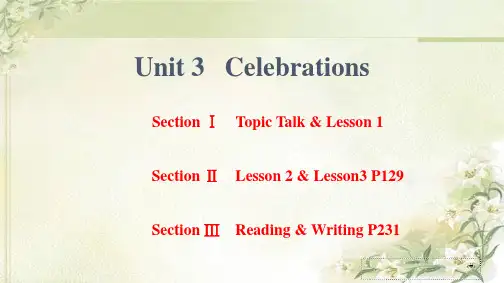
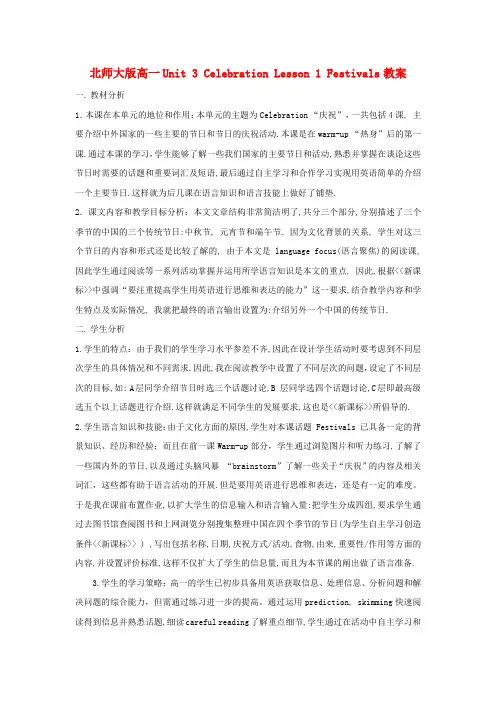
北师大版高一Unit 3 Celebration Lesson 1 Festivals教案一. 教材分析1.本课在本单元的地位和作用:本单元的主题为Celebration “庆祝”,一共包括4课, 主要介绍中外国家的一些主要的节日和节日的庆祝活动.本课是在warm-up “热身”后的第一课.通过本课的学习,学生能够了解一些我们国家的主要节日和活动,熟悉并掌握在谈论这些节日时需要的话题和重要词汇及短语,最后通过自主学习和合作学习实现用英语简单的介绍一个主要节日.这样就为后几课在语言知识和语言技能上做好了铺垫.2.课文内容和教学目标分析:本文文章结构非常简洁明了,共分三个部分,分别描述了三个季节的中国的三个传统节日:中秋节, 元宵节和端午节. 因为文化背景的关系, 学生对这三个节日的内容和形式还是比较了解的, 由于本文是language focus(语言聚焦)的阅读课, 因此学生通过阅读等一系列活动掌握并运用所学语言知识是本文的重点. 因此,根据<<新课标>>中强调“要注重提高学生用英语进行思维和表达的能力”这一要求,结合教学内容和学生特点及实际情况, 我就把最终的语言输出设置为:介绍另外一个中国的传统节日.二. 学生分析1.学生的特点:由于我们的学生学习水平参差不齐,因此在设计学生活动时要考虑到不同层次学生的具体情况和不同需求.因此,我在阅读教学中设置了不同层次的问题,设定了不同层次的目标,如: A层同学介绍节日时选三个话题讨论,B 层同学选四个话题讨论,C层即最高级选五个以上话题进行介绍.这样就满足不同学生的发展要求,这也是<<新课标>>所倡导的.2.学生语言知识和技能:由于文化方面的原因,学生对本课话题 Festivals 已具备一定的背景知识、经历和经验;而且在前一课Warm-up部分,学生通过浏览图片和听力练习,了解了一些国内外的节日,以及通过头脑风暴“brainstorm”了解一些关于“庆祝”的内容及相关词汇,这些都有助于语言活动的开展.但是要用英语进行思维和表达,还是有一定的难度。
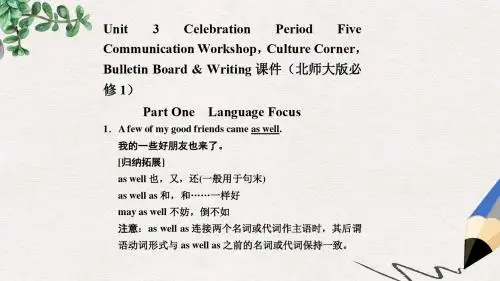
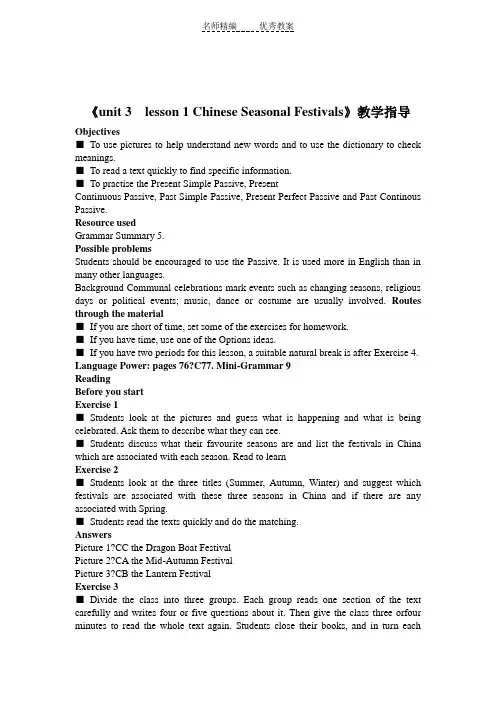
《unit 3 lesson 1 Chinese Seasonal Festivals》教学指导Objectives■To use pictures to help understand new words and to use the dictionary to check meanings.■To read a text quickly to find specific information.■To practise the Present Simple Passive, PresentContinuous Passive, Past Simple Passive, Present Perfect Passive and Past Continous Passive.Resource usedGrammar Summary 5.Possible problemsStudents should be encouraged to use the Passive. It is used more in English than in many other languages.Background Communal celebrations mark events such as changing seasons, religious days or political events; music, dance or costume are usually involved. Routes through the material■If you are short of time, set some of the exercises for homework.■If you have time, use one of the Options ideas.■If you have two periods for this lesson, a suitable natural break is after Exercise 4. Language Power: pages 76?C77. Mini-Grammar 9ReadingBefore you startExercise 1■Students look at the pictures and guess what is happening and what is being celebrated. Ask them to describe what they can see.■Students discuss what their favourite seasons are and list the festivals in China which are associated with each season. Read to learnExercise 2■Students look at the three titles (Summer, Autumn, Winter) and suggest which festivals are associated with these three seasons in China and if there are any associated with Spring.■Students read the texts quickly and do the matching.AnswersPicture 1?CC the Dragon Boat FestivalPicture 2?CA the Mid-Autumn FestivalPicture 3?CB the Lantern FestivalExercise 3■Divide the class into three groups. Each group reads one section of the text carefully and writes four or five questions about it. Then give the class three orfour minutes to read the whole text again. Students close their books, and in turn eachgroup asks its questions for the rest of the class to answer.■Students read the text again and fill in the table with the text information they get. ■Have students check their answers in pairs.■Encourage students to add another festival they know well.■Students read the questions and find the answers in the texts by reading the texts again.■Have students talk about their festival in pairs.AnswersPassage A:the Mid-Autumn Festival, September or October, moon cakesPassage B:the Lantern Festival, the fifteenth of the first month of the lunar calendar, sweet dumplingsPassage C:the Dragon Boat Festival, the fifth day of the fifth month of the lunar calendar, Zongzi Exercise 4■Students discuss in pairs and tell the class their opinions.Language Power: the Word Corner on page 79 givesfurther practice in vocabulary (clothes).GrammarTHE PASSIVE (I)Exercise 5■Students identify that the passive is used when we don’t know or there is no need to say who the “doer” of an action is.■Students then do the exercise, finding the sentences in the text and completing the verbs.■Refer students to Grammar Summary 5 to make sure they understand how to use the Passive correctly.■For further practice, ask students to answer questions about their school (or town), e.g. “When are school examinations held?When are school reports written? Where is football played?When are bells rung? When was this classroom cleaned? When was this school built?”Answers1. are made2. were, organizedExercise 6■ Have students look at the given sentences and ask them what tenses are used in them.■ Encourage students to draw rules for the formation of the passive forms. Ask them to refer Grammar Summary 1,3,4 and 5 on pages 92?C93.Answers1. has been arranged2. is being collected3. was being paintedExercise 7■ Ask students if they have heard of the Water Festival.■ Students re ad the text to find out about the festival. Then read the text again and complete the verbs.Answers1. is celebrated2. is splashed3. are carried4. are told5. is related6. are washed7. are raced 8. are launched■ Have st udents close their books and ask them to say what they can remember about the festival.Exercise 8■ Students work in pairs, changing the sentences into the passive. Answers1. My health is being affected by stress.2. People are being moved out of the houses.3. The mini-helicopter has already been invented by him.4. The forest fire has been put out by them.5. The car was being repaired when I got there.6. The house was being decorated when the accident happenedVocabularyExercise 9■ Student s may need to go back to the text to review the words before they start filling in the blanks.Answers1. is lit2. has decorated3. mark4. celebrate5. was included6. was burnt down7 take part in 8. be boiledLanguage in UseExercise 10■ Students work in groups, writing out the questions andadding more of their own questions using the Passive. Tell students they must know the answers to their questions. If you wish, they can finish the questions for homework and use reference sources to check their answers. Each group should have between 10?C15 questions.Answers1. Where is the Mid-Autumn Festival celebrated? (In China)2. Where is “zongzi” eaten? (In China)3. When is the Lantern Festival celebrated? (In China)4. Who was the telephone invented by? (By Alexander Graham Bell)5. Who was Romeo and Juliet written by? (By William Shakespeare)6. Where are BMW cars made? (In Germany)OptionsPracticeIn groups, students prepare a written description of SpringFestival in China. Tell students they are writing for English speaking readers who have not visited China. Students can follow the structure of the texts in the coursebook and, if possible, illustrate their text with a suitable drawing or photograph. When the groups have finished, they can exchange papers for others to read. ExtensionStudents, working individually or in pairs, carry out a research project (using reference books or the Internet) to find out about a seasonal festival in another country. Students then prepare a short talk about this festival to give to the class.。
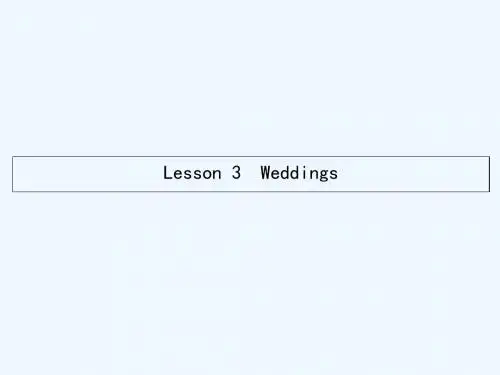
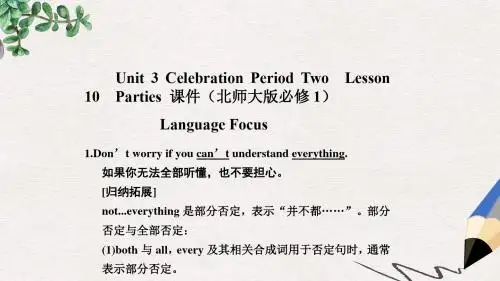
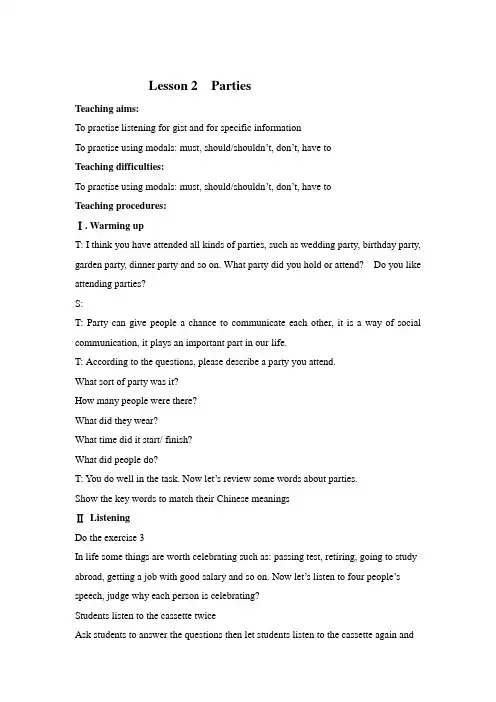
Lesson 2 PartiesTeaching aims:To practise listening for gist and for specific informationTo practise using modals: must, should/shouldn’t, don’t, have toTeaching difficulties:To practise using modals: must, should/shouldn’t, don’t, have toTeaching procedures:Ⅰ. Warming upT: I think you have attended all kinds of parties, such as wedding party, birthday party, garden party, dinner party and so on. What party did you hold or attend? Do you like attending parties?S:T: Party can give people a chance to communicate each other, it is a way of social communication, it plays an important part in our life.T:According to the questions, please describe a party you attend.What sort of party was it?How many people were there?What did they wear?What time did it start/ finish?What did people do?T: You do well in the task. Now let’s review some words about parties.Show the key words to match their Chinese meaningsⅡListeningDo the exercise 3In life some things are worth celebrating such as: passing test, retiring, going to study abroad, getting a job with good salary and so on. Now let’s listen to four people’s speech, judge why each person is celebrating?Students listen to the cassette twiceAsk students to answer the questions then let students listen to the cassette again andpause in each paragraph.Do the exercise 4When we attend a party we should follow social customs. what do you think should we do in parties?S:Now read through the advice, trying to complete the sentences and predicting what the answers will be.We will listen to about advice about how to behave in parties. (play the cassette for students to check their answers.ⅣSpeakingDo the exercise 5and 6Suppose you have a foreign friend who receives a invitation to a party.What to wear; What presents to take , When to arriveWhat to say, What not to do, When to leave,Divide students into groups to do the exerciseDo the exercise 7Ask students to match the expressions with different situation.ⅤHomework。
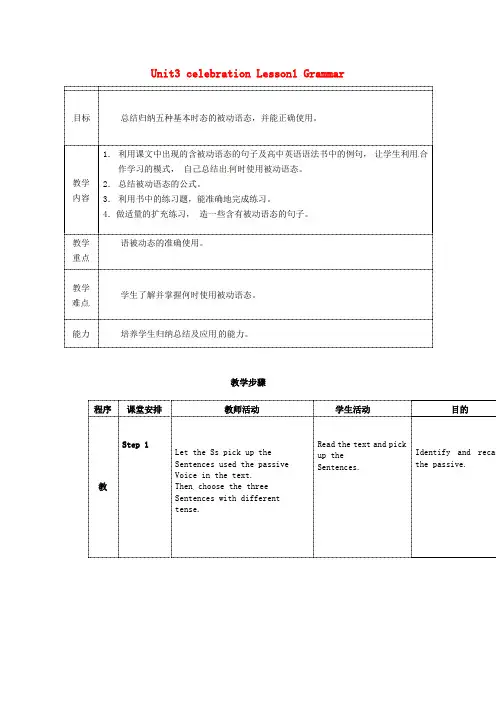
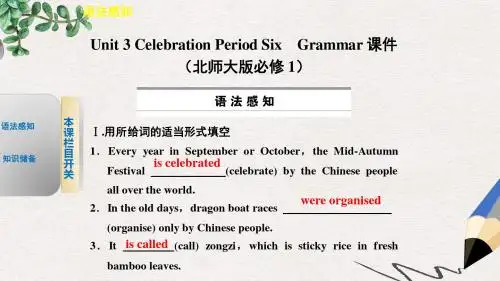
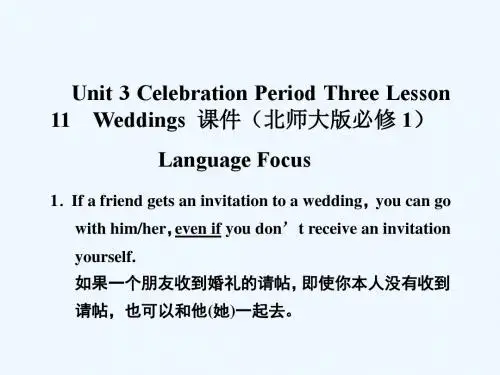
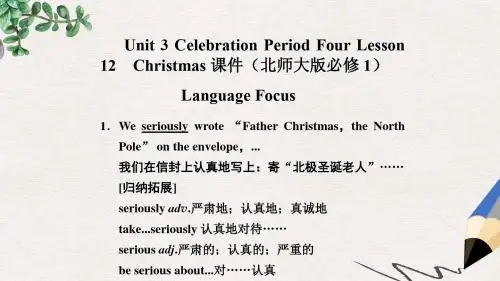
U3 CelebrationLesson 3 WeddingsTeaching aims:To read a text for new information about weddingsTo practise using modals: have to/ not have to , can/ can’t , ought to / ought not to To discuss the customs about wedding in ChinaTeaching difficulties:To practise using modals: have to/ not have to , can/ can’t , ought to / ought not to Teaching Aids: computer and cassetteTeaching procedures:Ⅰ. Warming upT:teacher will ask the following questions about weddings to lead into the topic. Have you ever been to a wedding party?Who was getting married?How many people were there?What time did it start/finish?What did they wear?What did people do?Did you have a wonderful time?Present the vow at the wedding to arouse students’ interest of talking about the weddings and have a deeper understanding about wedding in western countries.Do you know the meaning of the vow?从今天开始,无论顺境、逆境;无论贫穷还是富有;无论健康还是疾病,都不能将我们分开,直到生命的最后一天。
Unit3 celebration Lesson1设计原则本课时采取了“准确简洁、实用可学”的设计原则,侧重常态教学。
设计重点聚焦在以下两方面:学生活动的活动数量和质量;课堂的起伏和流畅。
模式新课标下的学生主体参与及合作学习目标1. 学生能够抓住语段中的关键词,理解主旨大意。
2. 学生能够知道如何介绍节日并能够尝试。
3.继承和宏扬中国传统文化。
教学内容1.掌握课文内容和词汇,并准确完成练习。
2.根据课文模式,结合自己喜欢的中国节日加以应用。
教学重点1. 在学习中掌握词汇和句型。
2.主要技能训练:读、说教学难点学生掌握词汇和句型并应用。
能力猜测、理解、归纳、应用、教法. 集体参与,小组合作,小组展示教学步骤程序课堂安排教师活动学生活动目的教Step 1Pre-reading1.Let the students say thenames of theirfavorite festivals of China.2.Ask the students in whatseason the festivals happen.Answer the questionsand listen to theteacher explain thenew words about falland seasonal.Arouse the Ss’interestStep 2 Reading 1.Read the text quickly andmatch the pictures with thefestivals2.Try to say out some keywords of each passage, ifthey can’t, teacher willgive the example, such as:the Mid-autumn Festival,September or October, mooncakes3.Read the passages again,then fill in the blanks.4.check the answers1.Silent reading,skimming2.Discussion andget the answer3.Show the answeron the screen1. Get the gener alidea of each passa ge2. Get the detailsand learn each otherStep 3:Post reading 1.Tell the students how todescribe a festival2.Let the students talk aboutSpring Festival3.Show the result.1. Do the exercisein class2. DiscussionShow their result1. Learn thevocabulary in thetest2. Use and enlargethe knowledge offestivalStep 4 Home- work 1. Reading paper2. Finish the Ex P79 5。
教学准备1. 教学目标学习与节日有关的词组、表达法,快速浏览文章,获取信息,掌握相关词汇句型a.To share statistics and information about Chinese festivals together.b.To encourage students to take part in celebrating and promoting the Chinese festivals.c.To practise writing a report about a festival or an activity using paragraph planning strategies.2. 教学重点/难点从文章中获取、处理主要信息,正确理解课文细节,从而生成影片配音、写作文段。
a.How to organize the activities in class scientifically and effectively.b.How to improve students’ and residents’ celebrating and promoting awareness through volunteers’ work after class.3. 教学用具Computer, projector, blackboard, learning sheet, etc.4. 标签Module 1 Unit 3 Celebration Lesson 1 Festivals 1st period Reading 教学过程Teaching procedures:Step ⅠGreetingsPursue an “easy”life. Festivals are connected to family u niting.A piece of traditional music create a festive and lively at mosphere that helps to attract students.Step ⅡPre-readingBrainstormingStudents exchange statistics and information collected from le ssons in this unit, notes, libraries, the Internet, encyclopa edias, magazine articles, television and radio documentaries, friends, etc.Keys:China’s major traditional festivals include the Spring Festival, th e Lantern Festival, Pure Brightness Day, the Dragon Boat Fes tival, and the Mid-Autumn Festival.Ethnic minorities have retained their own traditional festival s, including the Water Sprinkling Festival of the Dai people , the Nadam Fair of the Mongolian people, the Torch Festiva l of the Yi people, etc.Step ⅢReadingPassage C: Summer, the Dragon Boat FestivalA. QuizStudents work individually. Make sure every student take part in the quiz.Question: What does the Dragon Boat Festival mark?B. DiscussionRead Passage C for the second time and discuss in groups. Each group writes three or four questions about it. Then gr oups ask and answer questions in turn.Tips: when, what, how, special food, activities, etc.What does “fall”mean in the text?Fill-in blanks.C. ReportingReport what activities people take part in to celebrate the Dragon Boat Festival.Tips: the dragon boat race, the dragon boat dancing, walking on the land boat, scramble for ducks, etc.Passage B: Winter, the Lantern FestivalD. DiscussionRead Passage B and discuss in groups. Each group writes thr ee or four questions about it. Then groups ask and answer questions in turn.E. Fill-in blanks.The Lantern Festival marks the end of the Chinese New Year . One story about its origin said a god wanted to the town, but he was fooled by the.Passage A: Autumn, the Mid-Autumn FestivalF. SkimmingRead Passage A in groups. Try to keep as much as informati on in mind.G. Fill-in blanks.There are many festivals in China. The Mid-Autumn Festival is one of them. It is by all the Chinese in the world. Why is it so important? Because it is a special for family uniting. There are ma ny kinds of moon now, but the _______ones are ma de with bean paste.Step ⅣPost-readingWatch a short ad about Chinese festivals. Take notes and di scuss in groups. Then dub it one by one. Check the Englishdubbing in groups. Make sure the dubbing is structurally c ompleted with logical and accuracy words.Step ⅤSummaryEveryone should enhance the awareness of the importance of C hinese traditional festivals. In addition, students need to c ollect and write more to improve their skills.If time permits, students can share more about traditional f estivals.课堂小结The globalization of cultures is possible for the advanced m edia technology. The central government of China has done a lot to spreading Chinese cultures and ideas through promot ing Chinese festivals all over the world. Movies, books, Chi nese dishes together with other commercial elements are all direct driving powers. Everyone should enhance the awareness of the importance of Chinese traditional festivals. In additi on, students need to collect and write more to improve thei r skills in and after the class.课后习题AssignmentsA. Write a short essay about your favourite festival individ ually and display them on the class micro-blog.B. Design a plan for an Chinese festivals promotion activity , a poster included.C. Read texts in this unit and make notes of festivals.板书FestivalsIntroduction:Origins:Activities:Special food:Conclusion and recommendations:。
2019-2020年北师大版高中英语必修1 Unit 3《Celebration》(Lesson 4 Christmas)英文教案ObjectivesTo read a narrative text and understand the story.To build up an area of vocabulary associated with Christmas.To develop reading strategies to answer multiple-choice questions.To practise collocations with have, do and play.To talk about childhood memories.Pre-ReadingFind the Key Words in the pictures.Which of the things do you think western people have at Christmas?Key Wordsballoons, Christmas carols, Christmas pudding, Christmas tree, snow, snowmen, Christmas stockings, presentsReadingRead the text. Which Key Words are mentioned? Circle them out. Which other Christmas things are mentioned? Make a list.Answers:Father Christmas calendar Christmas cards Christmas lightscarol service Christmas tree decorations balloons stockingspresents sweets turkey Christmas pudding paper hatsQueen’s speech Christmas cakeWhat’s the main idea of each paragraph?Para. 1 the beginning of ChristmasPara. 2 decorations outsidePara. 3 activities on Christmas EvePara. 4 activities on Christmas morningPara.5 activities after lunchPost- ReadingIn what order did the children do these things?Example 1 da)open the new year calendarb)put their stockings at the end of the bedc)sing Christmas carolsd)write a letter to Father ChristmasChristmas tree Father Christmas carol service candle snowman decorationspresents turkeyChristmas stockingssweetsChristmas cakee)put up the Christmas treef)go to churchg)have Christmas cakeAnswers: 2 a 3c 4e 5b 6f 7gAnswer the multiple-choice questions.1 Who do you think reads the children’s letters?a) Father Christmas b) their parents c) nobody2 What do you think people do in a carol service?a) sing songs b) give presents c) watch a play3 What happened on Christmas Eve?a) The writer stayed awake all night.b) Someone put presents in his stocking.c) The writer saw Father Christmas.4 Why did they laugh?a) The Christmas carols were happy songs.b) The songs and hats were funny.c) The jokes and hats were funny.5 After lunch:a) the adults watched the Queen’s speech.b).the children made a snowman.c) everybody had more to eat.Answers: 1b 2a 3b 4c 5cVocabularyIn English, some verbs and nouns often go together. Complete the table with these words:tea, the piano, your homework, a shower, cards, a (snowball) fight, a party, the washing-up, lunch, the shoppingComplete the sentences with these verbs in the correct form.blow up, sing, go to, put up, have(x2), make, put onOn Christmas Eve, my grandparents arrived. We(1) a snowman in the garden and later we (2) the decoration. I (3) lots of balloons. On Christmas morning, I (4) some warm clothes and (5) a snowball fight with my cousins and then we(6) church. After that, we(7) lunch and(8) Christmas carols.Answers1 made2 put up3 blew up4 put on5 had6 went to7 had8 sangWriting and SpeakingMake notes about your childhood memories of an important festival.People: family? Good friends?Preparations: decorations? Invitations?Presents: what? Who for? Make/buy?Food: meals? Special food/drink?Activities: music? Dancing? A long walk?Your feelings: happy? Sad?。